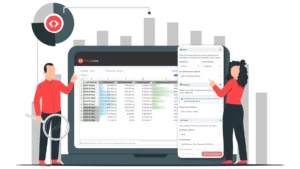Updated: April 12, 2024
As the vacation rental market continues to evolve, staying ahead in 2024 requires a keen understanding of revenue management.
In this enlightening discussion, Host Thibault Masson, Head of Product Marketing at PriceLabs and Founder of Rental Scale-Up talks with industry experts;
- Meaghan Moyle, Executive Director, Outpost
- Jordan Locke, Founder, RevPARTY & RevProfs
- Kevin Lincicome, Director of Revenue Management, Western Trust
The panel, guided by audience questions, delved into insightful discussions and imparted practical tips tailored for larger property managers, addressing the following key questions:
- How can you adapt your strategy in mid-January for maximum effectiveness?
- Why is year-over-year data analysis vital, and how can you use it to your advantage?
- What are the intricacies of booking windows in various markets, and how do they affect your strategy?
- How does cross-functional collaboration enhance revenue management in today’s market?
- What strategies can help manage owner expectations in a changing growth landscape?
Watch the replay on YouTube
About the speakers
Meaghan Moyle, the Executive Director of the Outpost group in Jackson Hole, Wyoming, has a background that began nine years ago at 360 Blue, a Property Management company in Florida Panhandle, where she transitioned from reservations to revenue management. Currently overseeing operations for approximately 250 units in Jackson, Meaghan’s passion for revenue management has grown stronger over the years.
Kevin Lincicome, Director of Hospitality and Revenue Management at Western Trust, started in sales and operations with Vacasa, a Vacation Rental Management company before focusing on revenue management. Having used PriceLabs extensively on thousands of units for various companies, Kevin brings a wealth of experience in tailoring strategies to different approaches. Now overseeing 11 markets, he serves as the Director of Hospitality and Revenue Management for Western Trust.
Jordan Locke, Founder of RevPARTY is based in Austin, Texas. Jordan has a diverse pricing experience, ranging from toilet seats to computer chips before entering the short-term rental industry eight or nine years ago. Having initiated the revenue management program at Vrbo, Jordan now offers consulting services through RevPARTY, covering a spectrum from projects to comprehensive revenue management solutions.
Q. 1. How can you adapt your strategy in mid-January for maximum effectiveness?
The discussion began with the host asking the big question on everyone’s minds. Is mid-Jan too late to fine-tune your strategies for the year.
Kevin emphasized the perceptual nature of strategy refinement, debunking the notion that it’s too late to fine-tune approaches. He advocated for adaptability in adjusting booking windows and occupancy-based matrices, recognizing the dynamic nature of the market. His emphasis on ongoing adjustments reflects a commitment to staying attuned to evolving industry trends and ensuring strategies remain effective throughout the year.
Meaghan aligned with Kevin’s perspective, and emphasized on understanding booking windows and categorizing properties based on these parameters provides a practical framework for fine-tuning approaches. She advocates for the implementation of revenue meetings as a means to foster comprehensive strategy discussions, demonstrating a holistic approach to revenue management that integrates various aspects of property operations.
Jordan added depth to the conversation by highlighting the need to consider trigger events beyond major occurrences. Locke’s focus on looking at the same time last year for vacation rentals addresses the unique challenges of this sector, where identical units are scarce for comparison. He cautions against overreacting to data and underscores the importance of nuanced analytical approaches tailored to specific market dynamics and property types.
Q.2. Why is year-over-year data analysis vital, and how can you use it to your advantage?
Meaghan delved into the practical implications of examining last year’s data. She stressed its significance in property management, where owners frequently refer to previous year statements and question current performance based on past figures. She acknowledged the accessibility of last year’s data, making it an easy comparison tool, but also urged property managers to consider dynamic pricing principles.
Kevin emphasized the importance of contextualizing year-over-year data. He encouraged property managers to take in consideration changing factors such as if their inventory has undergone changes.
Jordan emphasized the importance of considering trends and trigger events when analyzing year-over-year data in vacation rentals. He highlighted the challenge of having a small sample size due to the unique nature of each property, making comparisons to the same time last year essential. Locke introduced the concept of a blame box at RevPARTY, which involves creating a 2×2 grid to mathematically calculate attribute changes in RevPAR to different components. This approach helps property managers understand and focus on the factors influencing revenue, such as market dynamics, portfolio changes, and variations in ADR and occupancy.
Q. 3. What are the intricacies of booking windows in various markets, and how do they affect your strategy?
Meaghan provided insights based on her experience transitioning from a beach destination to a ski market. She highlighted the shift in booking windows, particularly in markets with a significant percentage of visitors flying in. She emphasized the importance of understanding and utilizing booking windows, not just from a revenue management perspective but also in collaboration with marketing teams. Using tools like KeyData, she recommended analyzing booking windows to make informed marketing decisions, adapt pricing strategies, and coordinate efforts for effective communication with potential guests.
Jordan expanded on the significance of booking windows, utilizing pacing data to gauge performance against comparable markets. He stressed the importance of timing property launches based on booking windows and occupancy trends. He also emphasized the need to consider the unique dynamics of second-tier destinations, where booking windows might experience shifts compared to primary markets. Additionally, he discussed the importance of pacing analysis and pricing sensitivity, guiding property managers to focus their efforts on areas that have a significant impact.
Kevin provided additional perspectives on booking windows, offering practical advice on how to analyze them. He recommended exploring various sources, such as PriceLabs, PMS data, and customized spreadsheet tools to understand booking windows and pacing. He however cautioned against knee-jerk reactions to pacing, encouraging a deeper analysis to uncover the reasons behind certain trends. He shared insights into how he uses a custom-built tool to evaluate booking windows, emphasising the importance of a nuanced approach to pricing decisions.
Q.4. How does cross-functional collaboration enhance revenue management in today’s market?
Meaghan could not stress enough about the importance of cross-functional collaboration in revenue management, emphasizing the interconnectedness of marketing and revenue strategies. Drawing on an analogy from Jason Sprinkle, CEO of KeyData, she likened revenue management to pricing bananas in a grocery store. Meaghan highlighted the significance of marketing in attracting guests to the “grocery store” and the need for a cohesive strategy between revenue management and marketing teams. By collaborating with reservation teams, insights into guest behavior and preferences can be gained, allowing for a more holistic understanding of the market. She emphasized the value of considering the 80/20 rule, focusing efforts on high-revenue properties, and understanding the intricacies of social media impact on bookings.
Kevin discussed his experiences working in different company structures, including situations where marketing departments drove marketing strategies independently. At Western Trust, where revenue management takes the lead, Kevin highlighted the importance of using promotions to assess ranking issues on OTAs and recommended owners actively book through OTAs initially to boost visibility. He emphasised the role of promotions in controlling pricing strategies and gaining insights into performance.
Q.5 What strategies can help manage owner expectations in a changing growth landscape?
All three speakers unanimously agreed on the importance of transparent and proactive communication with owners, providing context for market changes, and building strong relationships to navigate challenges effectively.
Jordan suggests being transparent and contextualizing data to help owners understand market behaviors and anticipate trends. He predicts a return to a more normal pattern in the rental market, with potential rate suppression, and encourages property managers to stay ahead by making incremental changes to pricing.
Meaghan emphasizes the importance of over-communicating and being transparent with owners. She suggested sending out regular newsletters, discussing the good and bad news, and providing context for changes in performance. She also highlighted the significance of addressing owner concerns promptly and sharing strategies to mitigate challenges. She anticipates more compressed booking windows in 2024 and emphasizes the need for clear communication on rate adjustments and marketing strategies.
Kevin underlines the value of relationships between local operations teams and owners, emphasizing that a good relationship can help navigate challenges more smoothly. He concludes by emphasizing the goal of building strong relationships with owners in 2024.
Additional resources
Watch the Conference Replay on YouTube.
Download the Transcript here.
Audience questions
For the Base Price suggestion, we look at the listing’s 30 day occupancy, how it differs from the market’s 30 day occupancy. Both these trends are observed for a period of maximum 60 days. The algorithm recommends an increase/decrease based on these trends. This increase/decrease is applied on top of a weighted average of past base prices – where more recent choices of base price have a higher weight. Read more.
You can use Portfolio Analytics inside PriceLabs to understand your booking window. Here in the KPIs, you will see your average booking window (only based on your past bookings). If your scroll down, you can also see booking window by months and you can select your preferred dates. This article will tell you more.
Portfolio Analytics does a great job of providing reporting capabilities for a property (or group of properties) performance compared to itself over different time periods. You can combine comp sets from Market Dashboards to compare property performance to the market. We hold monthly live webinars on both topics with links to videos of past webinars available as well. Check out our Trainings schedule.
Weekend/weekday booking windows are extremely hard to define as a host’s minimum length of stay and market supply has a significant bearing on the results.
On the listings Neighborhood Data -> Future Prices graph, you can enable “Your Last year bookings” and “Upcoming bookings” and in the same graph it will show you approximately in which percentile the bookings are.








